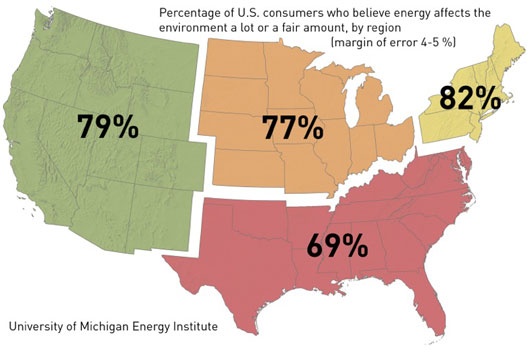Southerners think differently about energy impact

Live in the South and in the market for a new car? Need to replace some light bulbs?
Chances are you think a little less than other Americans that your choice will have an impact on the environment.
A University of Michigan survey released Tuesday found that Southerners are less likely than Americans elsewhere to believe that energy affects the environment.
The survey, done by the university's Institute for Social Research and the Energy Institute, found that 69 percent of Southerners felt their energy choices had either "a fair amount" or "a lot" of environmental impact.
In the Midwest, 77 percent of the public said their energy choices have a fair amount or more impact, while 79 percent said such in the West and 82 percent in the Northeast.
The quarterly survey is conducted via phone interview with roughly 500 households nationwide per month. It has a margin of error of plus or minus 4 percent.
Difference in perception
One key -- though perhaps subtle -- distinction is that Southerners say they worry about energy's impacts to the same extent as other Americans do, said John DeCicco, research professor at the UM's Energy Institute and the survey director.
It's just that not as many Southerners believed that energy was having a detrimental impact.
"We don't see a distinction in how much they worry about it," he said. "We do see a fair amount of distinction in their perception of whether energy actually is affecting the environment."
Reliability and affordability concerns
Indeed, when it comes to concerns about energy reliability or affordability, Southerners are no different from other Americans, the survey found.
On average, they pay the same amount for home energy as the rest of the nation (Westerners pay the least, according to University of Michigan researchers). A little over half the nation worries about energy affordability, while about one third worries about reliability, both slight increases from the previous survey, in January 2014.
Other insights from the latest energy survey:
- On average, Americans believe that gasoline would become unaffordable if it hit roughly $5.89 per gallon, about 70 percent higher than the U.S. average gasoline price of $3.44 per gallon for the months the survey was taken.
- A monthly home energy bill of roughly $400 would be unaffordable for most Americans households, an amount double the average self-reported energy bill of $190 per month.
- Consumers appear to be notably more sensitive to increases in the price of gasoline than they are to increases in home energy bills.
- Consumers worry much less about the reliability of energy than they do about its affordability and impact on the environment.
The University of Michigan Energy Survey is administered four times a year through a set of questions added quarterly to the Thomson Reuters/University of Michigan Surveys of Consumers, the same instrument that is the basis for the widely reported Index of Consumer Sentiment.
